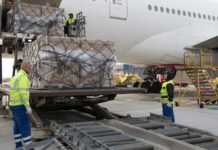
Clarksons’ analysis shows that US President Donald Trump’s 90-day pause on import tariffs, except those from China, means that for now, 6% of global container trade, amounting to 29 million TEU, is affected, compared with 11% prior to the moratorium.
On 8 April, a day before additional tariffs were to be effected on US imports from every country, Trump offered a 90-day pause, except for Chinese imports, which have been slapped with elevated tariffs of 145%. Trump said the higher tariffs on China were in response to the latter’s retaliatory tariffs on US imports.
Clarksons estimates that the higher taxes on imports from China could affect 63 million tonnes of seaborne container trade.
The brokerage stated that a significant short-term reduction in Transpacific container trade volumes is expected amid uncertainty and elevated tariffs on US imports from China particularly.
Clarksons said: “Lost trade looks likely in medium-term given higher tariffs and macroeconomic impacts on key consumer markets. Impacts likely mostly on Transpacific given the 90-day ‘pause’ on higher tariffs on countries other than China.”
US-China bilateral trade is only 1.5% of global seaborne trade but more significant in containers, noted Clarksons.
Clarksons said that upside could come if the trade tensions could be resolved. Tariffs could also disrupt service networks, leading to congestion or idled ships.
However, if container volumes collapse as a result of crippling tariffs, there could be downsides, which will be compounded if Red Sea transits resume.
Alison Koo
Asia Correspondent




